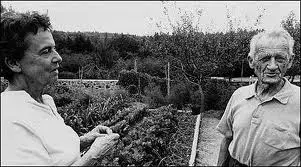
While many people went back to the land because of an impending societal crisis, for others the crisis was personal. Such was the case for Helen and Scott Nearing, who went back to the land in the 1930s and whose book Living the Good Life would become the inspiration for thousands of homesteaders in the 1970s.
Scott Nearing was raised in a well-off family in Pennsylvania and decided to study economics at the University of Pennsylvania’s Wharton School. As Scott recalled in his 1972 autobiography The Making of a Radical, one of his teachers, Simon Patton, warned him to avoid the topic of “distribution of income” if he wanted a stable career as a professor. Being strongly individualistic and contrary, Scott decided to focus on that precise topic. He soon became a socialist, and when he saw the atrocities of World War I, he became a pacifist as well. Soon his outspoken and unpopular views cost him his job as a professor. Classifying him as a dangerous political subversive, the FBI searched his house in 1918 and confiscated all his personal papers. (They also continued to search his mail for the rest of his life). His publisher immediately canceled his contract and took all of his books out of print.
Having stood so strongly for his socialist views, it seemed inevitable that Scott would join the Communist Party, which he did in 1927. But after he wrote a book about imperialism that disagreed with Lenin, Scott was formally expelled from the Party. He divorced his first wife, Nellie Seeds, because he thought she was too bourgeoisie because she had lace doilies in the house. In 1928, Scott began a relationship with Helen Knothe, a vegetarian and theosophist who was willing to live the same kind of simple life as Scott.
Rejected by society, Scott and Helen decided to go back to the land in the early 1930s. They bought a piece of property in Vermont in 1932 and moved to the country fulltime in 1940, supporting themselves with a successful business selling maple syrup and maple sugar. “We wanted to control our own source of livelihood,” the Nearings wrote in their 1950 Maple Sugar Book. “The community had left us no choice in the matter by denying the chief wage earner of our family group the opportunity to practice his profession—which is teaching.” They also “wanted to get our feet on the earth and to get our hands into it—to make and keep that incomparably important contact with nature which balances life at the same time that it cleanses it, rejuvenates it, and keeps it sane.”
For the Nearings, simple living was a protest against an overconsumptive, capitalistic, bourgeois society. They ate a sparse vegetarian (mostly vegan) diet from wooden bowls, grew their own vegetables, and refused to participate in modern consumerism. They made enough money from their maple syrup business, lectures, and books sales to support their simple lifestyle. And they always held true to the ideals that had spurred them to go back to the land in the first place.
“Dare we break away from a social pattern that all the best people endorse as the last word in human achievement?” they asked in The Maple Sugar Book. “Certainly in North America the answer lies almost wholly with ourselves…In each generation there will be adventurous, determined, imaginative young people (and some not so young) who will count it their choicest privilege to leave the beaten path and blaze out new trails. It is of such stuff that old pasts become new futures."
Inspiring account. Thank you for compiling this. Makes me think of all the other people who did not object to the business professor's approach.